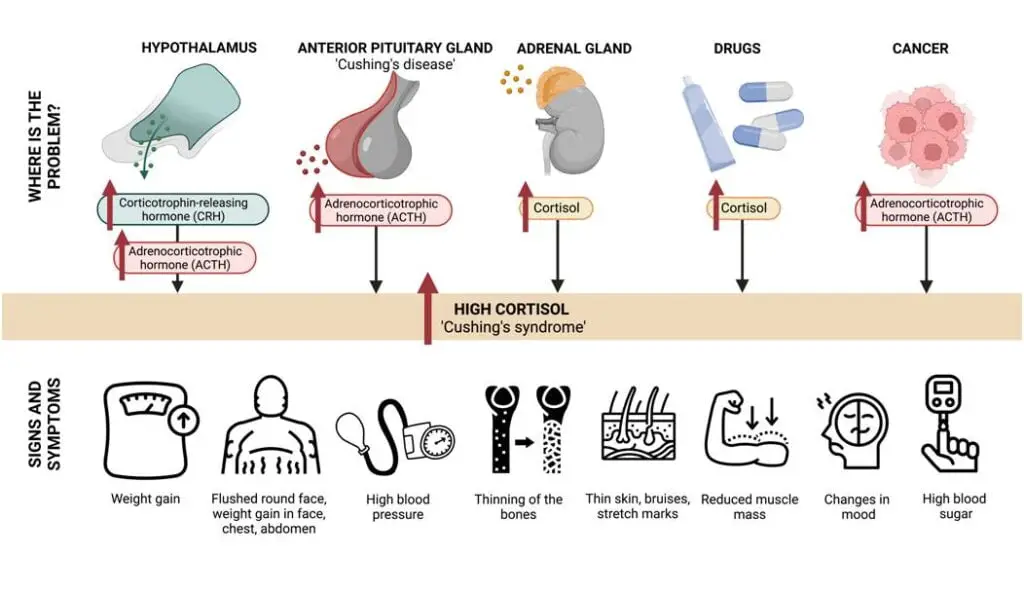How to Lower Cortisol Levels: Cortisol, often known as the stress hormone, plays a crucial role in our body’s functioning. While it’s essential for survival, elevated cortisol levels can lead to various health issues. In this article, we’ll explore effective strategies on how to lower cortisol levels naturally.
How to Lower Cortisol Levels
While cortisol is necessary, excessive amounts can have detrimental effects on both physical and mental health. Proper cortisol regulation is essential for overall well-being.
What is Cortisol?
Cortisol is a steroid hormone produced by the adrenal glands, which are located on top of your kidneys. It is often referred to as the “stress hormone” because it plays a key role in the body’s fight-or-flight response. While it plays a crucial role in the body’s response to stress, chronic elevated levels of cortisol can have adverse effects on health. ‘How to Lower Cortisol Levels’

How Cortisol Works:
- The hypothalamus: The hypothalamus, a part of the brain, senses stress and sends a signal to the…
- Pituitary gland: The pituitary gland, another part of the brain, then releases a hormone called adrenocorticotropic hormone (ACTH).
- Adrenal glands: ACTH stimulates the adrenal glands to release cortisol.
Cortisol has a wide range of effects on the body
- Increasing blood sugar levels: Cortisol helps to break down carbohydrates into glucose, which is the body’s main source of energy.
- Suppressing the immune system: Cortisol helps to reduce inflammation, which can be helpful in the short term but can be harmful in the long term.
- Boosting energy: Cortisol can help to increase alertness and focus.
- Aiding in memory and learning: Cortisol plays a role in regulating the hippocampus, which is involved in memory and learning.
Maintaining a healthy balance of cortisol is important for overall health. Chronically high cortisol levels can lead to a number of health problems, including:
- Weight gain
- High blood pressure
- Heart disease
- Diabetes
- Anxiety
- Depression
- Difficulty sleeping
How to Decrease Cortisol Levels by Natural ways
1. Practice Relaxation Techniques: Engage in activities that promote relaxation, such as deep breathing exercises, yoga, meditation, or progressive muscle relaxation. These techniques help reduce stress and lower cortisol levels.
2. Get Adequate Sleep: Aim for 7-8 hours of quality sleep each night. Lack of sleep can increase cortisol levels, so establishing a consistent sleep routine is essential.
3. Regular Exercise: Engage in regular physical activity, but avoid overtraining. Moderate-intensity exercises, such as brisk walking, swimming, or cycling, can help lower cortisol levels. ‘How to Lower Cortisol Levels’
4. Balanced Diet: Consume a balanced diet rich in fruits, vegetables, whole grains, and lean proteins. Avoid processed foods, excessive sugar, and caffeine, as these can contribute to elevated cortisol levels.
5. Limit Alcohol and Caffeine: Excessive alcohol and caffeine consumption can increase cortisol levels. Moderate your intake or consider eliminating them if you’re sensitive to their effects. ‘How to Lower Cortisol Levels’
6. Spend Time in Nature: Spending time in natural environments has been shown to reduce stress and lower cortisol levels. Take regular breaks to connect with nature, even if it’s just a walk in a park.
7. Social Support: Maintain strong social connections and seek support from friends, family, or support groups. Social interaction can help reduce stress and lower cortisol levels. ‘How to Lower Cortisol Levels’
8. Avoid Chronic Stress: While some stress is unavoidable, chronic stress can take a toll on your health. Identify and address the sources of chronic stress in your life, whether it’s work-related, personal, or environmental.
9. Herbal Remedies: Certain herbs, such as ashwagandha, holy basil (tulsi), and chamomile, have been traditionally used to reduce stress and lower cortisol levels. Consult a healthcare professional before using any herbal supplements.
Ashwagandha: An adaptogenic herb, ashwagandha, has shown promise in reducing cortisol levels and managing stress.
Rhodiola Rosea: Known for its stress-relieving properties, Rhodiola Rosea helps the body adapt to stressors, regulating cortisol release.
Holy Basil: Holy Basil, or Tulsi, possesses anti-stress properties, aiding in cortisol reduction. ‘How to Lower Cortisol Levels’
Lifestyle Changes
Time Management: Efficient time management and setting realistic goals contribute to stress reduction and cortisol balance.
Social Connections: Maintaining strong social ties provides emotional support, buffering against the negative effects of stress.
Leisure Activities: Engaging in hobbies and leisure activities serves as a healthy distraction, reducing cortisol levels.
Importance of Hydration
Water and Cortisol Regulation
Staying hydrated is crucial for overall health, including cortisol regulation. Dehydration can exacerbate stress levels. ‘How to Lower Cortisol Levels’
Conclusion
In conclusion, understanding how to lower cortisol levels is essential for maintaining overall health and well-being. By incorporating lifestyle changes, adopting stress-reducing practices, and seeking professional guidance when needed, individuals can effectively manage cortisol levels and promote a healthier, more balanced life.
FAQs on Cortisol Levels
What is cortisol?
Cortisol is a hormone produced by the adrenal glands that plays a crucial role in metabolism, inflammation regulation, and the sleep-wake cycle.
How does stress affect cortisol levels?
Chronic stress triggers continuous cortisol release, leading to elevated levels that can impact health negatively.
Can diet influence cortisol?
Yes, certain foods and dietary choices can impact cortisol levels. A balanced diet is crucial for cortisol regulation.
Are there natural remedies for cortisol reduction?
Yes, practices like exercise, meditation, and herbal supplements can naturally help lower cortisol levels.
When should one seek medical help for cortisol imbalance?
Individuals experiencing persistent symptoms of high cortisol, such as chronic stress or disrupted sleep, should consult healthcare professionals.











